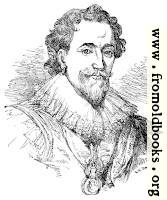Herbert, William
, earl of Pembroke, was born at Wilton in Wiltshire, April 8, 1580, and admitted of Newcollege in Oxford in 1592, where he continued about two | years. In 1601, he succeeded to his father’s honours and estate; was made knight of the garter in 1604; and governor of Portsmouth six years after. In 1626 he was elected chancellor of the university of Oxford, and about the same time made lord steward of the king’s houshold. He died suddenly at his house called Baynard’s-castle, in London, April 10, 1630; according, as Wood foolishly says, to the calculation of his nativity, made several years before by Mr. Thomas Allen, of Gloucester-hall. Clarendon, however, seriously relates, concerning this calculation, that some considerable persons connected with lord Pembroke being met at Maidenhead, one of them at supper drank a health to the lord steward: upon which another said, that he believed his lordship was at that time very merry; for he had now outlived the day, which it had been prognosticated upon his nativity he would not outlive; but he had done it now, for that was his birth-day, which had completed his age to fifty years. The next morning, however, they received the news of his death. Mr. Park remarks that had his lordship possessed a credulous mind, it might have been suspected that this astrological prediction had worked upon his feelings, and occasioned a temporary suspension of the animal faculties, which was too hastily concluded to be dissolution; for Mr. Granger states it as an accredited fact in the Pembroke family, that when his lordship’s body was opened in order to be embalmed, he was observed, immediately after the incision was made, to lift up his hand. This remarkable circumstance, adds Granger, compared with lord Clarendon’s account of his sudden death, affords a strong presumptive proof that his distemper was an apoplexy. Lord Pembroke was not only a great favourer of learned and ingenious men, but was himself learned, and endued with a considerable share of poetic genius. All that are extant of his productions in this way, were published with this title: “Poems written by William earl of Pembroke, &c. many of which are answered by way pf repartee by sir Benjamin Rudyard, with other poems written by them occasionally and apart,” 1660," 8vo.
The character of this noble person is not only one of the most amiable in lord Clarendon’s history, but is one of the best drawn. We can, however, give only a few particulars. “He was,” says the great historian, “the most universally beloved and esteemed of any man of that age; | and having a great office in the court, he made the court atself better esteemed, and more reverenced in the country: and as he had a great number of friends of the best men, so no man had ever the confidence to avow himself to be his enemy. He was a man very well bred, and of excellent parts, and a graceful speaker upon any subject, having a good proportion of learning, and a ready wit to apply it, and enlarge upon it: of a pleasant and facetious humour, and a disposition affable, generous, and magnificent. He lived many years about the court before in it, and never by it; being rather regarded and esteemed by lung James, than loved and favoured. As he spent and lived upon his own fortune, so he stood upon his own feet, without any other support than of his proper virtue and merit. He was exceedingly beloved in the court, because he never desired to get that for himself which others laboured for, but was still ready to promote the pretences of worthy men: and he was equally celebrated in the country, for having received no obligations from the court, which might corrupt or sway his affections and judgment. He was a great lover of his country, and of the religion and justice which he believed could only support it: and his friendships were only with men of those principles. Sure never man was planted in a court who was fitter for that soil, or brought better qualities with him to purify that air. Yet his memory must not be flattered, that his virtues and good inclinations may be believed he was not without some alloy of vice he indulged to himself the pleasures of all kinds, almost in all excesses,” &c. It ought not to be forgot that this earl of Pembroke vras a munificent contributor to the Bodleian library, of two hundred and forty-two Greek Mss. purchased by him in Italy, and formerly belonging to Francis Barroccio. This gift is commemorated by an inscription over the collection in the library, where also are a painting and a statue of his lordship. Pembroke-college was so named in honour of him. 1




![[the book]](../../g/51o5Nrb97gL._SL160_.jpg)